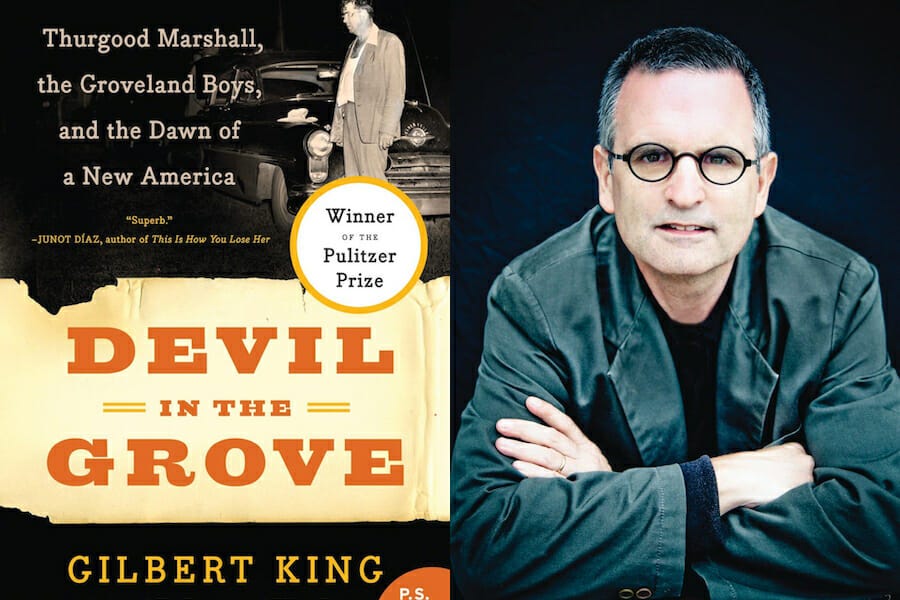By Guest Contributor Marc Friedman
"Devil in the Grove" by Gilbert King is a compelling account of one of the most significant legal cases in American history – “The Groveland Boys.” Winner of the Pulitzer Prize for Nonfiction, this epic work traces the harrowing events surrounding the notorious Groveland Boys case in Lake County, Florida, a county ruled with an iron fist by a racist and brutal sheriff named Willis McCall who served for decades.
The book opens in 1949 in Central Florida’s Lake County where racial tensions ran high, the Jim Crow mentality was still widespread, and a deeply ingrained two-tier justice system, one for Whites and one for Black residents existed. A young white woman, Norma Lee Tyson Padgett, from a poor rural family, falsely accused four young Black men, the Groveland Boys, of abducting her and raping her.
A group of KKK members including McCall’s Deputy Sheriff James Yates, a beastly man, and possibly Sheriff McCall himself, shot and killed one of the young men, even though he had been miles away from the alleged abduction and rape.
After the men were arrested, McCall bound two others together with handcuffs, told them to get into his car, took them together to a deserted area, and with Yates shot them point blank. One died and the other, Walter Irvin, survived only by pretending he was dead as well.
King poignantly describes the first trial where Irvin and another Groveland Boy, Charles Greenlee, were convicted. Irvin was sentenced to death. And to the chagrin of McCall, Greenlee was sentenced to life imprisonment rather than death. King in the book then goes on to describe the appeals process, including to the US Supreme Court. Then there was the retrial of Irvin and subsequent appeals, again including to the Supreme Court. In fact, Supreme Court Justice Robert Jackson wrote, “The case presents one of the best examples of one of the worst menaces to American justice. It is on that ground I would reverse it.”
King paints a sordid story of the fate of the Groveland Boys and the Jim Crow South where they lived until they died. "Devil in the Grove" is a product of the author’s prodigious research. Relying upon a treasure trove of archival material, court transcripts, and interviews, King carefully reconstructs the case. He does a thorough job of describing the legal strategies, courtroom dramas, and the personal lives of those involved, making the book feel both historical and deeply personal.
To his great credit, King humanizes the Groveland Boys as well as their families. He takes a deep dive into their experiences living in an area that was essentially ruled through terror by the KKK. We read of beatings, bombings, lynchings and other murders, and corruption from the local police department up to the Florida Governor’s mansion.
“Devil in the Grove” is really three books in one. The first, of course, is about the Groveland Boys case that King describes in riveting detail. The second book is about the history of the NAACP and the famous Legal Defense Fund that never gave up and continued fighting for justice in the most opprobrious of circumstances.
The third book is about the legendary Thurgood Marshall, who, through sheer will and indomitable efforts, was determined to change the direction of life in America for Blacks and others. With Brown v. Board of Education and dozens of other cases, he succeeded mightily before being nominated to the US Supreme Court by President Lyndon B. Johnson.
One particularly interesting aspect of “Devil in the Grove” is the deepening relationship between Marshall and J. Edgar Hoover, the head of the FBI. Over time Marshall and Hoover developed a deep mutual respect. They became close allies and confidantes, usually non-publicly, in fighting racial prejudice in the Deep South.
"Devil in the Grove" is a riveting, thought-provoking book. King's superb research, compelling narrative, and exploration of systemic racism made it worthy of a Pulitzer Prize. I recommend “Devil in the Grove” wholeheartedly for those who are interested in American history, the two-tiered legal system of the Jim Crow South, and the heroic efforts of lawyers like Marshall, his LDF colleague Jack Greenberg and others in seeking and attaining a measure of justice not just for their clients but for America. This is why in the book’s subtitle, Gilbert King describes Marshall and the Groveland Boys as “the Dawn of a New America.”
One quote from Marshall poignantly sums up “Devil in the Grove.” He stated, “this is the worst case of injustice and whitewashing I have come across in my career.” No doubt Marshall was correct. But there was some degree of justice in the end. Irvin finally was acquitted and Greenlee, who was jailed for years, had his sentence commuted by then recently-elected Florida Governor Leroy Collins who “realized we had to change.”
An Invitation from Diamond-Michael Scott
“Black Books, Black Minds” is a key foundation of my Great Books, Great Minds” passion project. For me, it’s a labor of love fueled by the endless hours of work I put into researching and writing these feature articles. My aim is to ignite a new world of community, connection, and belongingness through the rich trove of Black History books, thought leaders, and authors we unearth.
So if you are enjoying this digital newsletter, find it valuable, and savor world-class book experience featuring non-fiction authors and book evangelists on Black History themes, then please consider becoming a paid member supporter at $6.00/month or $60.00/year.






Excellent review of a dark period hopefully in our rear view mirror.